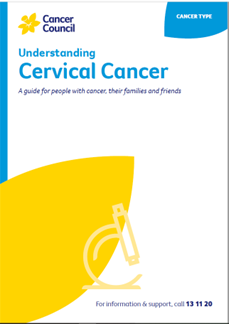- Home
- Cervical cancer
- Managing side effects
- Bowel changes
Bowel changes
After surgery or radiation therapy, you may notice changes in your bowel habits. You may have constipation or diarrhoea, or feel pain in your abdomen from trapped wind.
Learn more about:
- Radiation proctitis
- Tips for managing bowel changes
- Video: Eating well after a cancer diagnosis
- Podcast: Appetite Loss and Nausea
Radiation proctitis
Radiation therapy can damage the lining of the rectum, causing inflammation and swelling known as radiation proctitis. The risk of developing radiation proctitis is low and your treatment team will try to reduce this risk. Radiation proctitis is usually a short-term side effect but may be ongoing in a small number of people. It can cause a range of symptoms including: blood in bowel movements; diarrhoea; the need to empty the bowels urgently; and loss of control over the bowels (faecal incontinence).
You may develop some of these symptoms for other reasons. Let your treatment team know if you develop any of these symptoms. If you have ongoing bowel problems, you may be referred to a gastroenterologist.
Tips for managing bowel changes
- Drink peppermint or chamomile tea to reduce abdominal or wind pain.
- Drink plenty of water to replace fluids lost through diarrhoea or to help soften stools if you’re constipated.
- Avoid alcohol and cut down on coffee, cola and other drinks that contain caffeine.
- Avoid spicy and fatty foods.
- See a women’s health physiotherapist for information about exercises to strengthen your pelvic floor and anal muscles. Also see our Exercise for people living with cancer information and videos.
- Talk to your doctor or a dietitian about what to eat, or ask about suitable medicines.
For more on this, call Cancer Council 13 11 20, or see Nutrition and cancer.
The blood vessels in the bowel and bladder can break more easily after radiation therapy. This can cause blood to appear in urine or faeces (poo), even months or years after treatment. Let your doctor know if this occurs so you can be given the appropriate treatment.
→ READ MORE: Impact on sexuality and intimacy
Video: Eating well after a cancer diagnosis
Podcast: Appetite Loss and Nausea
Listen to more episodes from our podcast for people affected by cancer
More resources
Prof Martin Oehler, Director of Gynaecological Oncology, Royal Adelaide Hospital, and Clinical Professor, University of Adelaide, SA; Dawn Bedwell, 13 11 20 Consultant, Cancer Council QLD; Gemma Busuttil, Radiation Therapist, Crown Princess Mary Cancer Centre, Westmead Hospital, NSW; Dr Antonia Jones, Gynaecological Oncologist, The Royal Women’s Hospital and Mercy Hospital for Women, VIC; Angela Keating, Senior Psychologist, Royal Hospital for Women, NSW; Anne Mellon, Clinical Nurse Consultant – Gynaecological Oncology, Hunter New England Centre for Gynaecological Cancer, NSW; Dr Inger Olesen, Medical Oncologist, Andrew Love Cancer Centre, Barwon Health, Geelong, VIC; Dr Serena Sia, Radiation Oncologist, Fiona Stanley Hospital and King Edward Memorial Hospital, WA; A/Prof Megan Smith, Co-lead, Cervical Cancer and HPV Stream, The Daffodil Centre, Cancer Council NSW and The University of Sydney, NSW; Emily Stevens, Gynaecology Oncology Nurse Coordinator, Southern Adelaide Local Health Network, Flinders Medical Centre, SA; Melissa Whalen, Consumer.
View the Cancer Council NSW editorial policy.
View all publications or call 13 11 20 for free printed copies.



